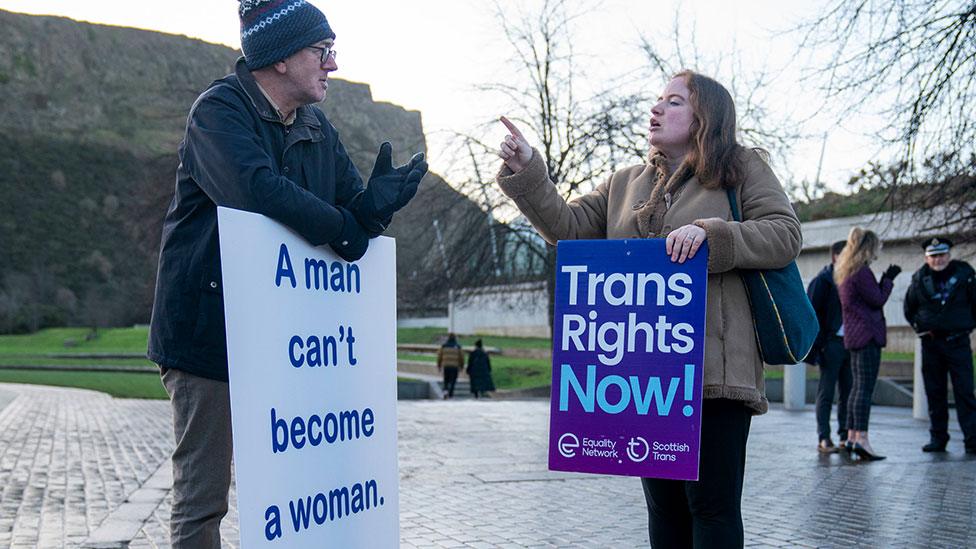Nicola Sturgeon's gender conundrum: Is Isla Bryson a man or a woman?
- Published
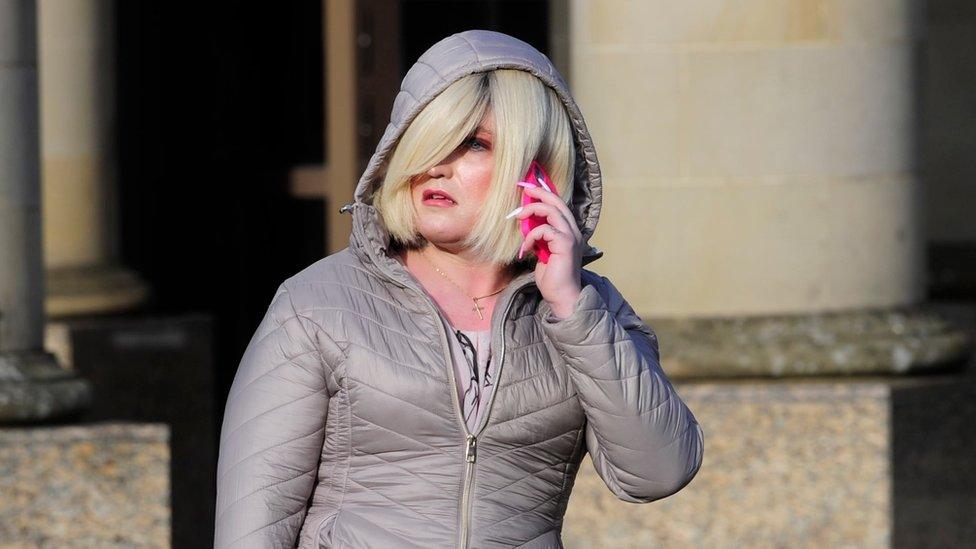
Isla Bryson, a convicted rapist, was moved from Cornton Vale to a male wing at HMP Edinburgh
Is Isla Bryson a woman?
The logic of an individual being able to change their own gender with minimum fuss would suggest the answer is yes.
Last month, after being convicted of raping two women, Bryson was initially sent to the all-female jail at Cornton Vale in Stirling for assessment.
But critics said the 31-year-old's decision, taken after being charged, to renounce the male identity of Adam Graham should not be accepted at face value.
The stark question of whether even a rapist should be extended the courtesy of being able to insist that they are a woman is now at the heart of the controversy.
At a news conference and in the Scottish Parliament this week, First Minister Nicola Sturgeon was repeatedly asked whether she thought Bryson was a man or a woman.

Bryson was convicted of rapes carried out while known as Adam Graham
The case has provoked an outcry, after which the inmate was moved from the female prison estate to the male wing of Edinburgh's Saughton jail, and the Scottish Prison Service (SPS) paused the movement of all transgender prisoners while it carried out an urgent review.
The charity Scottish Trans – which campaigns for "equality, rights and inclusion" for transgender and non-binary people – said it favoured, external an "individualised risk assessment" in such cases and that no-one convicted of sexual violence who posed a risk to women should be housed in the female prison estate.
The SPS review of the Bryson case agrees with that. It says information about the prisoner was conflicting and limited, while decision making could have been quicker.
But it concludes that Bryson did not come into contact with any female prisoners.
The SPS says all transgender prisoners will now be sent for an initial assessment to establishments which align with their gender at birth, and no-one with a history of violence – including sexual offences – will be housed in the female estate, at least while a wider review of the issue is completed.
Before the review's publication, the first minister repeatedly insisted she had confidence in the prison service's handling of "these matters".
As the politician arguably most closely associated with the concept of gender self-identification, Ms Sturgeon has clearly found the Bryson case, along with that of Tiffany Scott, tricky to handle.
But the SNP leader's support for the pause in transgender prisoner transfers drew a scornful reaction from her arch-critic, JK Rowling.
The author tweeted Ms Sturgeon had "made it very clear that every woman's group and safeguarding expert raising concerns about her supposedly progressive agenda is a bigot".
She added: "What can possibly have changed? Surely not her cast iron principles?"
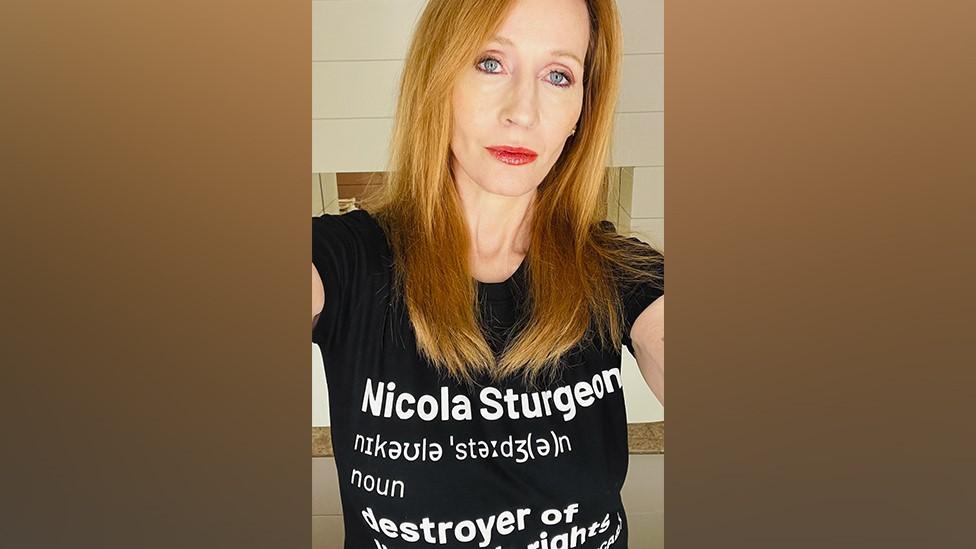
JK Rowling posted a picture of herself wearing a t-shirt that described Nicola Sturgeon as a "destroyer of women's rights"
At a news conference on Monday, the first minister tried very hard not to reference Bryson's gender at all, instead referring to "the individual".
Eventually Ms Sturgeon stumbled.
"My comments about her, err, the person, being a rapist is in context of what should happen to them within the prison service," she said.
A few minutes later Tom Gordon of The Herald pounced.
"I think you just referred to Isla Bryson using the word 'her', does that mean you do in fact think she is a woman?" he asked.
An uncomfortable exchange followed, with Ms Sturgeon at one point exclaiming in frustration: "Well, fine!"
"She regards herself as a woman. I regard the individual as a rapist," was the closest the SNP leader came to clarifying her position.
The muddle, say the critics, underlines the foolishness of legislation designed to make it easier for people in Scotland to switch gender.
The Gender Recognition Reform Bill passed at Holyrood in December would remove medical, legal and administrative hurdles which must currently be cleared before someone in Scotland can obtain a Gender Recognition Certificate (GRC), which enables them to change the sex recorded on their birth certificate.
It would also cut the age limit to do so from 18 to 16, a move which polls suggest is particularly unpopular with the public.
At present this process is governed throughout Great Britain by the Gender Recognition Act 2004, external, though a GRC is not needed to amend a driving licence or passport.
The First Minister points out that the Holyrood bill passed by a wide margin of 86 votes to 39, with support from MSPs of all parties including a handful of Conservatives.
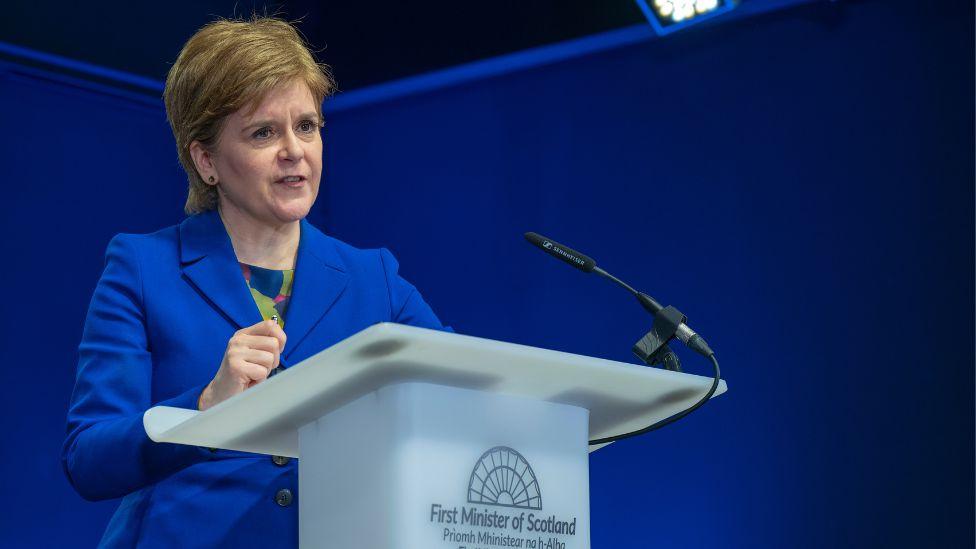
Some campaigners for trans rights say society is indulging in a bout of moral panic, increasing the risk of transgender people being the victims of hate crimes which were already rising sharply.
A wide range of organisations, from Amnesty International to Scottish Womens Aid and the Scottish Trades Union Congress, have been robust defenders of the law.
In a joint statement last month, external they said the bill would have no impact "on women's services, the operation of the Equality Act, or single sex spaces".
"Our organisations see the paths to equality for women and trans people as being deeply interconnected and dependent on our shared efforts to dismantle patriarchal systems that impose barriers to full equality for us all," they concluded.
But opponents say the act would conflict with the Westminster Equality Act 2010 by, for example, making it more difficult for women-only spaces to exclude people who were born biologically male.
The UK government has blocked it from receiving royal assent.
This is where the culture wars and the constitution collide, with Ms Sturgeon describing the UK government's action as an attack on democracy. It remains very likely that she will seek a judicial review of the move.
In doing so she will not have unanimous support in the SNP, let alone in the wider independence movement.
'Nicola Sturgeon's poll tax'
"It may infuriate Nicola Sturgeon," wrote former SNP deputy leader Jim Sillars in the Sunday Times, external, "but it seems that JK Rowling's political judgment is superior: the Gender Recognition Reform (Scotland) Bill will be Sturgeon's poll tax."
In the Sunday Post, external, former SNP MSP Joan McAlpine described gender self-ID as a "personal passion of the first minister", adding that she "must answer for any harm done - to women, obviously, but also to her party and the cause of independence".
Alex Salmond, now leader of the Alba Party, told BBC Radio 4's World at One that his successor as first minister had been "reduced to incoherence" on the subject, with self-ID "dissolving to dust when it clashes with reality".
There is now a wider debate about organisations embracing the concept of self-ID.
For example, Police Scotland guidance, external for its own workforce states that obtaining a gender recognition certificate or undergoing a "medical intervention such as hormone treatment or surgery" is not necessary to transition gender.
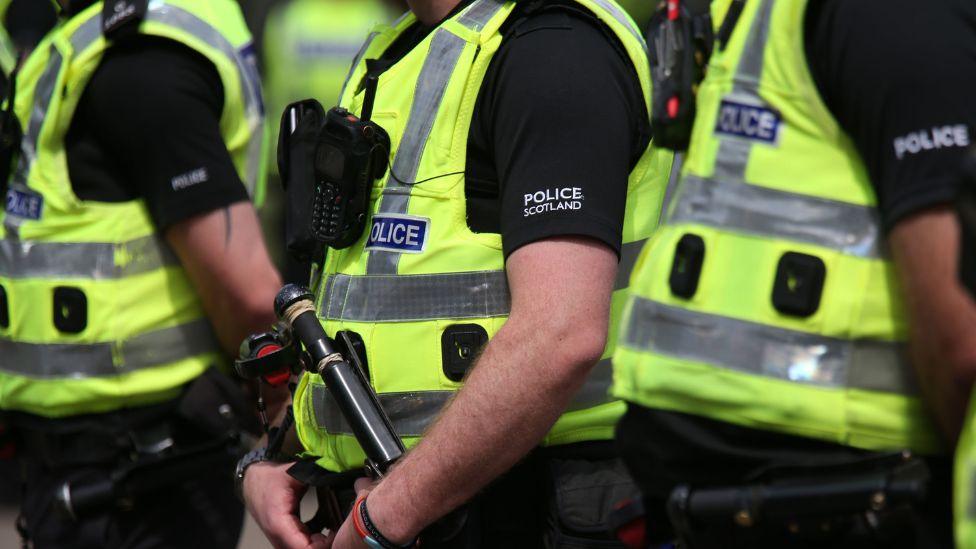
"All team members are entitled to use toilet and changing facilities for the sex in which they are currently living, regardless of whether they undergo gender reassignment." the guidance adds.
That is similar to internal guidance issued by London's Metropolitan Police force, external, which states that a trans person "does not need to 'prove' their right to use the toilet in anyway, including producing a Gender Recognition Certificate".
The Equality Act, external "prohibits discrimination, for example in employment or the provision of public services, on the basis of protected characteristics, one of which is gender reassignment", though it does allow providers of single-sex services to exclude transgender people if that is regarded as "a proportionate means of achieving a legitimate aim".
An example given in the legislation is that of a group counselling session for female victims of sexual assault.
However, these restrictions are limited and in a recent case at the Court of Session in Edinburgh, judge Lady Haldane concluded that the meaning of sex for the purposes of the Act was "not limited to biological or birth sex, but includes those in possession of a GRC obtained in accordance with the 2004 Act stating their acquired gender, and thus their sex".
How that affects the exemptions in the 2010 Equality Act has been a matter of debate.
Other European countries have also moved to enshrine gender self-ID in law, including Ireland and more recently Spain, while Wales is also taking steps to make it easier to legally change gender.
Journalists have also had to grapple with this issue.
The BBC News website style guide says "'gender identity' means how people feel or present themselves, distinct from their biological sex or sexual orientation".
It adds: "A person born male who lives as a female, would typically be described as a 'transgender woman' and would take the pronoun 'she'. And vice versa.
"We generally use the term and pronoun preferred by the person in question, unless there are editorial reasons not to do so."
This Bryson case raises fundamental questions about the human condition.
Who are we? Is our identity determined by body or mind? Is gender fluid? Is sex immutable?
Such questions have challenged philosophers in the abstract for centuries. Now they are challenging our leaders in the most vivid and practical manner.
- Published11 February 2020
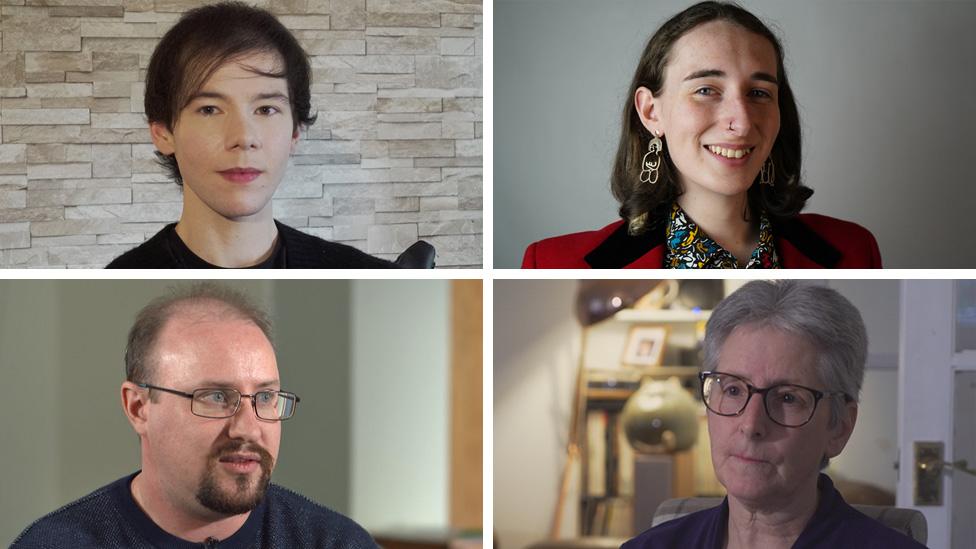
- Published23 December 2022
